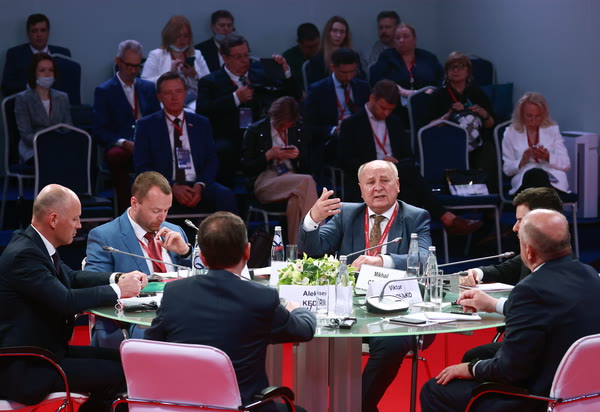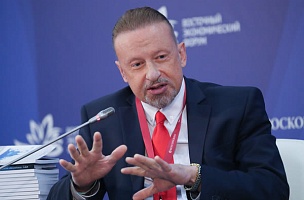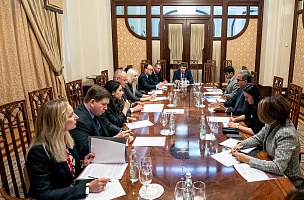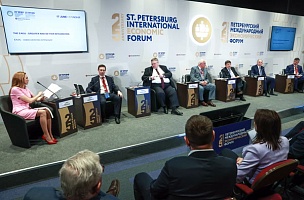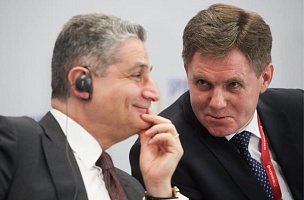Key conclusions
Faster decision-making procedures and introduction of new medications to the market make the Eurasian pharmaceutical market more viable and favour its export potential
“We see that our domestic industry is capable of producing almost the full range of essential medications: about 80% out of 809 items can be made in our country with a different rate of localization. We have learned to work and introduce medical products to the market. You probably remember decree 441, which upset many of our foreign partners and made many people in country blame us, calling it an experiment, and so on. However, we see that a lot of countries – almost all the countries – have chosen the fast-track way for introducing medications to the market,” Victor Fisenko, First Deputy Minister of Health of the Russian Federation.
“This is an unusual moment. The business community has come up with a whole range of initiatives that target increasing the capabilities when it comes to registration inspection. Many of them were included in the Eurasian Economic Union documents. Short and sweet: a registration portfolio may contain less paperwork, if one of the member states keeps them in the market. This is an extended opportunity for providing a national GMP certificate for registration purposes until 31 December 2024. This is an update of GMP rules that now include more approaches to production certification. Undoubtedly, another important trend is the use of remote procedures. It does not only concern drug circulation, but other types of regulation as well and has had a favourable impact on the time of laboratory inspections for registration purposes,” Viktor Nazarenko, Member of the Board, Minister in charge of Technical Regulation, Eurasian Economic Commission.
“We applaud to the most recent decisions of the Eurasian Commission that will help create competitive Eurasian regulations. Regulations that would keep up with national-level decision making – first of all, in the Russian Federation. To be honest, we were a bit sceptical at first, because we feared that national regulators may not have been making decisions fast enough. The Government of the Russian Federation has been leading and driving these processes. However, thanks to our discussion with the Eurasian Commission and the regulators of all the countries, the Commission has joined the processes promptly and has now become the driver <…>. The key to joint success is smart and harmonized regulations,” Vladimir Shipkov, Executive Director, Association of International Pharmaceutical Manufacturers (AIPM).
“Forum materials mentioned the outlook for the ‘Made in the EAEU’ brand. I would like to say that the EAEU norms are aligned with international rules. It concerns efficiency, quality, and safety. This is why the ‘Made in the EAEU’ brand is very promising, because these are the medications, the products that indeed comply with all the requirements. When it comes to our fast tracks, we have learned to introduce medical products to the market without compromising the quality. This is why the quality control system created earlier has proven its efficiency over the recent years. <…> Our country now boasts only high-quality, efficient, and safe medications,” Victor Fisenko, First Deputy Minister of Health of the Russian Federation.
Russia has managed to skip the developing countries’ path and is now on the way of creating innovative products
“Being a developing market, the Russian Federation is taking the same path other developing markets have taken. Everything starts with distribution, which takes 10–15 years. Then distributors realize they can produce instead of just selling. They build plants, where things start with a range of generics. The next logical step is producing innovative medications, and this is just the stage we have approached,” Vadim Kukava, Executive Director, The Association of Pharmaceutical Companies “Innovative Pharma”.
The Eurasian market potential is not limited to import substitution only
“I believe we have the potential for not just import substitution, but for creating new molecules. Pharma 2030 and the new initiative called ‘Medical science for people’ will contribute to that. There are several promising developments among the victories of the Ministry of Health. <…> We believe that our mission is getting over this ‘Death Valley’, while these initiatives may be part of it. It means intercommunication and a fast track from invention to industry – to the actual market,” Victor Fisenko, First Deputy Minister of Health of the Russian Federation.
COVID became a good testing ground for working under current conditions
“The COVID situation and the emergency norms we had to adopt to mitigate the risks have formed the backbone of this regulatory act. First of all, they include decree 441 and many other things the industry has been talking about for years, like expedited registration or certifying medications without registration at all, if they have undergone expert appraisal in the EAEU countries. It has somewhat prepared us for the mobilization economy we have now found ourselves in. The Ministry of Health has done a great job in this sense,” Vadim Kukava, Executive Director, The Association of Pharmaceutical Companies “Innovative Pharma”.
PROBLEMS
Logistics and materials require complex solutions
“Now we are facing new challenges, so the federal authorities and our industry are busy looking for new solutions, such as coming up with new logistics to supply substances, excipients, and equipment – everything needed for producing medications and for further development,” Victor Fisenko, First Deputy Minister of Health of the Russian Federation.
Bureaucracy can be in the way of the pharmaceutical market’s flexibility
“Initially, a different procedure for creating a single Eurasian market was conceived. However, administration and legal practices have led to its own peculiar bureaucracy and has become identical to primary registration in accordance with the requirements of the Eurasian Economic Union. This is not the way. It should not be this way. We will not be able to create an export or a pharmaceutical potential by 2025, if we do not dramatically simplify the conformity procedure. <…> Let’s make the confirmation and the GMP certificate issued in the Eurasian Union grounds for being included in the Eurasian register automatically or semi-automatically,” Vladimir Shipkov, Executive Director, Association of International Pharmaceutical Manufacturers (AIPM).
“We still experience bureaucratic difficulties and challenges related to obtaining GMP certificates. It is indeed a fairly lengthy process. I support my colleagues in saying that if there are ways to speed it up or to simplify it or to make it more convenient, we as producers would be interested and we would by all means support it,” Mikhail Grubman, Biotech Sales and Export Director, NPO Petrovax Pharm.
We need to have the right communication both with partners and consumers
“Now both federal authorities and the industry face the need for a publicity campaign that will help doctors and patients put their trust in medications. This is why the brands ‘Made in the EAEU’ and ‘Made in Russia’ need to become a quality seal that both the medical community and patients will trust. The numbers on efficiency, safety and quality that we see fully confirm my words,” Victor Fisenko, First Deputy Minister of Health of the Russian Federation.
“Pretty much all the EAEU pharmaceutical market players face practically the same tasks. It is building a good dialogue among the government, the pharmaceutical business and the society in terms of trust and cooperation. The second task everyone has shared during the pandemic that is now over is ensuring national drug security. We need to provide our people with guaranteed accessible high-quality and safe medications,” Marina Durmanova, President, Association for the Support and Development of Pharmaceutical Activities of the Republic of Kazakhstan.
Intellectual property must be protected both domestically and internationally
“Of course, protection of intellectual property is a matter of great importance both in Russia and around the globe. As producers and developers of original products, we are interested in intellectual property rights being protected in Russia, much like they are protected in other countries. <…> We believe these rights must be protected equally – be it our rights abroad or the rights of our international partners in Russia,” Mikhail Grubman, Biotech Sales and Export Director, NPO Petrovax Pharm.
“When companies start producing innovations, they state that intellectual property is a maxim of law. Protection is equally important both in the Russian Federation and outside of it. Because if we fail to do it here, why would we expect our patents treated with respect in other countries?” Vadim Kukava, Executive Director, The Association of Pharmaceutical Companies “Innovative Pharma”.
SOLUTIONS
Eurasian countries need to think of themselves as of a single market
“I remember the times when very few people believed in the success of the Eurasian integration. However, I dare say that this project turned out to be a success thanks to the efforts of member countries’ regulators and business communities, the Eurasian Committee and the international industry. At least we can say so in terms of grounds for discussing a fairly ambitious task to develop the export potential of the EAEU pharmaceutical industry. <…> But first of all, we need to acknowledge and appreciate the first successful single market of the Eurasian Economic Union. This is the first pharmaceutical market. We cannot develop the expert potential without acknowledging this fact,” Vladimir Shipkov, Executive Director, Association of International Pharmaceutical Manufacturers (AIPM).
The prices for our products can be a competitive advantage
“We can say that one of the advantages of our products is the price – in the domestic market, in the EAEU market and beyond. We believe that the domestic market and the EAEU one, including our strategic partners, are the most promising for us. It does not only concern generics, but biotech products as well,” Victor Fisenko, First Deputy Minister of Health of the Russian Federation.
It makes sense to use foreign regulators’ best practices
“I think it is about time to use the experience of global regulators for the fast-developing areas and decision-making mechanisms. It is regulatory reliance and trust. It does not mean acknowledging the results of other countries’ regulators. It means taking them into account. Taking them into account when making our own decisions. If some of the original innovative products are already registered in other markets, in other jurisdictions that can be respected within our national jurisdiction or within the Eurasian Economic Union, why don’t we factor it in when making important decisions on ensuring accessibility of – let’s say – innovative products in our national healthcare’s best interest,” Vladimir Shipkov, Executive Director, Association of International Pharmaceutical Manufacturers (AIPM).
A single export centre can create a good potential for promoting EAEU-produced medications
“There is an initiative that requires a more detailed approach. Our President mentioned it in Bishkek. He said that it made sense to consider creating a single Eurasian export centre.
Creating such a centre will obviously take a long or at least a profound preparation. But if this export centre can make promoting EAEU-produced medications one of its projects, it will justify its creation,” Aleksey Kedrin, Chairman of the Board, Association of Pharmaceutical Manufacturers of the Eurasian Economic Union (EAEU).


